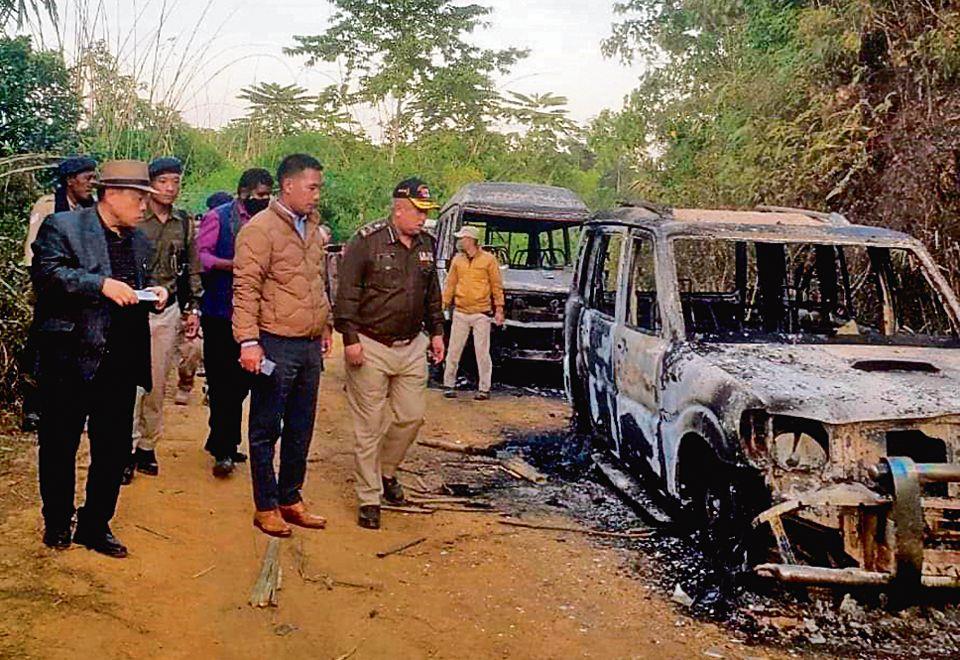
Gruesome: Nagaland killings point to the need for accountability among security forces. PTI
Vikash Narain Rai
Former Director, National Police Academy, Hyderabad
Here is a routine police news that appeared in the newspapers on December 8, presumably reassuring the readers about there being an even-handed police set-up rather than alarming them about the uneven authority-accountability police matrix: “The Bengaluru city police have suspended a sub-inspector for allegedly assaulting a 23-year-old Muslim youth in a police station and forcing him to drink urine. Deputy Commissioner of Police (West) said that an interim report was submitted on Monday, based on which Harish was suspended for dereliction of duty, not reporting to the police station, and for not registering the case. A departmental inquiry has also been ordered to probe the allegations made by the victim’s family.” Is this a matter of individual misuse of authority promptly set right by the prescribed mechanism of accountability?
The message from Mon, Nagaland, is loud and clear: In a hurtful law and order set-up, the unbridled use of executive authority cannot be offset by a sham of penal accountability. On the evening of December 4, six innocent citizens were killed in the Army’s intelligence-based ambush of a vehicle mistaken to be transporting ultras. The Army promptly announced an inquiry and the local police, sensing the public sentiment, registered suo motu a case of intentional murder. The Union Home Minister regretted in Parliament the tragic loss of civilian lives, promising justice to the families, and directed various agencies to prevent such occurrences in future. The Opposition too expressed solidarity with the victims and denounced the callous operation in one voice.
However, the issue that is begging to be addressed is not to be limited to the accountability of the operating armed personnel per se, but the sustainability of the authority-accountability matrix in any complex law and order situation. The chief ministers of Nagaland and Meghalaya have straightaway demanded the repeal of AFSPA (Armed Forces Special Powers Act), the immunity Act, long resented as a harbinger of recklessness on the part of the armed forces. The Northeast Students’ Organisation (NESO), the biggest student body in the region, has since joined the widespread protests against the continuation of AFSPA.
What is missed in a typically stand-alone matrix of authority-accountability is the element of the citizen’s accessibility to legal and constitutional remedies. The matrix is insulated from the citizen, warranting an intervention from the civil society. The law and order set-up in India, heavily favouring the element of authority, was created to support a colonial polity. Post-Independence, in spite of a democratic framework of governance, if it has carried on as an essentially feudal set-up encasing the abundance of authority in a veneer of weak accountability, there must be practical rewards too. Obviously, it is a constitutional mismatch but administratively as well as politically, an acceptable proposition for the stakeholders.
Both Prime Minister Narendra Modi and NSA Ajit Doval have shown enthusiasm in striking a Naga peace accord via the 2015 framework agreement with the NSCN (IM), the main Naga insurgent outfit. Unfortunately, the deadline of October 2019 has passed but no accord could be signed owing to the non-resolution of issues like Greater Nagalim beyond the boundaries of Nagaland and a separate Constitution for the state. The Mon tragedy is bound to further harden the sentiments of the (Naga) civil society. Addressing IPS officers passing out of the National Police Academy, Hyderabad, Doval had said last month that the civil society “can be subverted, suborned, can be divided to hurt the interest of a nation.” But which segments of governance or public life cannot be?
The ruling dispensation is not known to encourage any inclusive aid-in-governance role for the civil society. Even the government’s recent historic retreat in the face of the farmers’ agitation was announced and not negotiated. On the conclusion of the 56th DGPs/IGPs conference at the Uttar Pradesh Police headquarters in Lucknow, Modi tweeted the essentials of his policy on November 21: “One of the things I emphasised on was the setting up of a High-Power Police Technology Mission to look at the usage of latest technology to make policing more effective and citizen-friendly.”
Fittingly, during the conference, the PM was apprised of the achievements of the UP Police since 2017, including an unprecedented number of extra-judicial killings in police encounters of criminals and confiscation of their property. Predictably, there are possible dividends to be earned in an election milieu in Uttar Pradesh. There is indeed an influential section among the electorate which compliments the methods of the Yogi Adityanath government.
There are consequences too. In pursuing its avowed agenda of neutralising the mafia, the state government has turned the police force into specialised mafia units and the administration has often been caught trying to muffle the voice of the civil society. A recently released joint fact-finding report by three prominent human rights organisations into 17 UP encounter episodes in which an inquiry was ordered by the National Human Rights Commission (NHRC) in May 2018, pointed out gross violations of law in investigating these killings. It noted, “Independent bodies such as the NHRC and oversight mechanism such as magisterial inquiries have failed to identify these violations of law and have ignored factual contradictions in the police version of events. Instead, they have routinely condoned the unconstitutional procedures followed by the police during these investigations.”
Arguments like no one wants to kill civilians and swift punishment to criminals in a justice-starved society are at times made from a valid position. However, one should be careful not to extend undue glamour to a system of governance that intends to eclipse civil society.
Join Whatsapp Channel of The Tribune for latest updates.




























